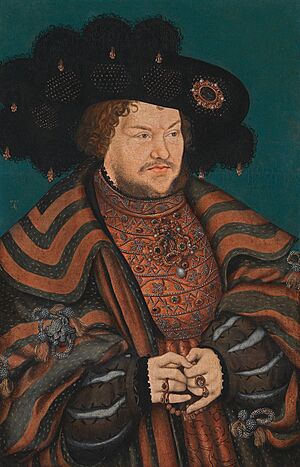Joachim I Nestor, Elector of Brandenburg facts for kids
Quick facts for kids Joachim I Nestor |
|
|---|---|

Portrait by Lucas Cranach the Elder (1529)
|
|
| Elector of Brandenburg | |
| Reign | 9 January 1499 – 11 July 1535 |
| Predecessor | John Cicero |
| Successor | Joachim II Hector |
| Born | 21 February 1484 Cölln, Margraviate of Brandenburg, Holy Roman Empire |
| Died | 11 July 1535 (aged 51) Stendal, Holy Roman Empire |
| Spouse |
Elizabeth of Denmark
(m. 1502) |
| Issue | Joachim II Hector, Elector of Brandenburg Anna, Duchess of Mecklenburg Elisabeth, Duchess of Brunswick-Calenberg-Gottingen Margaret, Duchess of Pomerania, Princess of Anhalt-Zerbst John, Margrave of Brandenburg-Küstrin |
| House | Hohenzollern |
| Father | John Cicero, Elector of Brandenburg |
| Mother | Margaret of Thuringia |
| Religion | Roman Catholic |
Joachim I Nestor (born 21 February 1484 – died 11 July 1535) was a very important ruler in Germany. He was a Prince-elector of the Margraviate of Brandenburg from 1499 to 1535. This meant he was one of the powerful princes who helped choose the Holy Roman Emperor. Joachim was the fifth ruler from the House of Hohenzollern family. His nickname, Nestor, came from a wise king in ancient Greek stories.
Contents
Early Life and Family
Joachim was the oldest son of John Cicero, Elector of Brandenburg. He received an excellent education from Dietrich von Bülow, who was a bishop and a chancellor at Frankfurt University.
Becoming Elector
When his father passed away in January 1499, Joachim became the new Elector of Brandenburg. Soon after, in 1502, he married Elizabeth of Denmark. She was the daughter of King John of Denmark.
Joachim's Children
Joachim and Elizabeth had five children together:
- Joachim II Hector (born 1505 – died 1571)
- Anna (born 1507 – died 1567), who married Albert VII, Duke of Mecklenburg-Güstrow
- Elisabeth (born 1510 – died 1558), who married twice
- Margaret (born 1511 – died 1577), who also married twice
- John (born 1513 – died 1571)
Ruling Brandenburg
In the early years of his rule, Joachim focused on making Brandenburg a more orderly place. He took strong actions to improve how the government worked and how justice was served. He also helped businesses grow and supported the needs of the towns.
Imperial Election of 1519
In 1519, a new Holy Roman Emperor needed to be chosen. Joachim's vote was very important. Both King Francis I of France and Charles of Habsburg wanted his support. Joachim received many promises from both sides. He even hoped to become Emperor himself! But when the election happened, he voted for Charles, who won. Even so, Joachim and Charles didn't become close friends. Joachim often talked with Charles's enemies in the years that followed.
Family Influence and Finances
The House of Hohenzollern family, to which Joachim belonged, wanted to gain more power. Joachim and his brother, Albert, worked together to help Albert become a powerful church leader. Albert became the Archbishop of Magdeburg and then Halberstadt. These positions were very important because they also controlled land, making them "prince-bishoprics."
Getting these powerful church jobs often involved spending a lot of money to convince people. The Hohenzollern family borrowed huge amounts of money from a rich banking family called the Fuggers to help Albert get the important Archbishopric of Mainz in 1514. This gave their family control over two of the seven votes needed to choose the Emperor.
Indulgences and Debt
Church rules said Albert was too young for such a high position. Also, he wasn't supposed to hold so many important church jobs at once. To get special permission from the Pope, the Hohenzollerns had to pay even more money.
To help pay back these huge debts, the Pope allowed Albert to sell "indulgences." Indulgences were special papers that people could buy to reduce the punishment for their sins. The money from these sales was supposed to help pay back the loans, give a share to the Pope, and cover the family's own expenses.
The Rise of Protestantism
The neighboring Elector of Saxony, Frederick the Wise, also wanted the Mainz position but didn't get it. He had his own debts but no way to sell indulgences to pay them off. Because he was upset, he stopped the sale of indulgences in his lands. This allowed Martin Luther to speak out against them.
Joachim Nestor, however, strongly supported the Roman Catholic Church. His brother, Archbishop Albert, was actually the first person Luther criticized. Joachim urged the Emperor to enforce the Edict of Worms, which declared Luther an outlaw. At many meetings, Joachim was a leading opponent of the Reformers, who wanted to change the church.
Later Life and Legacy
Joachim Nestor was a supporter of learning. In 1506, he founded the Viadrina University in Frankfurt (Oder). He also promoted Georg von Blumenthal, a strong Catholic leader, to important positions.
However, Joachim faced challenges within his own family. His wife, Elizabeth, converted to Lutheranism, a new Christian faith, against his wishes. In 1528, she had to flee to Saxony for safety. Joachim was saddened to see other family members also start to favor Protestantism. He passed away in Stendal in 1535.

